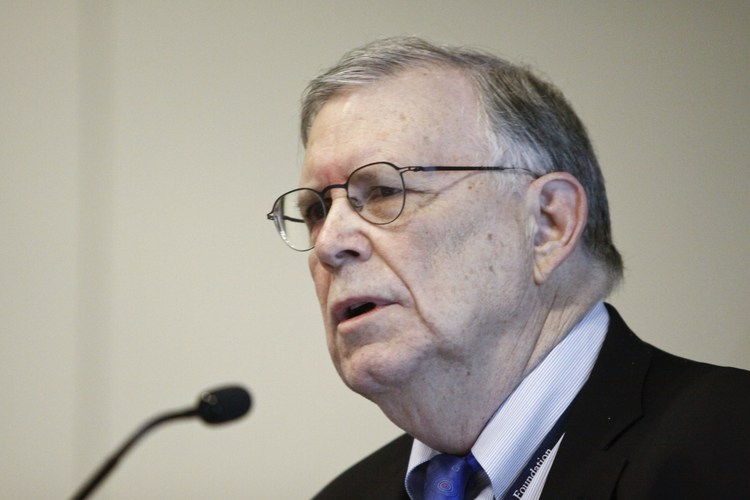'Significant noncompliance' could be added reason for public notice of law school problems

Barry Currier, the ABA’s managing director of accreditation and legal education. File photo by the Canadian Press Images/Michael Desjardins.
A proposal to add “significant noncompliance” to the list of when the ABA’s Section of Legal Education and Admissions to the Bar may post public notice about a law school not meeting a standard—rather than keeping the matter confidential—is being considered by the group’s council, which met Feb. 9 in San Antonio.
The proposal will be sent out for notice and comment, according to a summary of the meeting that the section posted. Its council is recognized by the U.S. Department of Education as the national accreditor of law schools, and there are various issues that the agency would see as significant noncompliance. That includes situations where the conduct implicates a school’s institutional integrity, or the area of noncompliance is one where public notice would best serve the interest of students and prospective students.
Rule 52 of the ABA Standards and Rules of Procedure for Approval of Law Schools requires confidentiality for decisions and recommendations made by the Standards Review Committee or the council, excluding exceptions detailed in Rule 53, the directive for which a proposed change was submitted by the committee.
Other proposed changes to Rule 53 outlined in the Jan. 22 memo from committee chair Pamela Lysaght include adding language that public notice may be given when a law school submits a teach-out plan for approval.
Under the rule’s current version, reasons for public notice include a law school being placed on probation or receiving “sanctions or specific remedial action” from the council. Additionally, public notice is given when a law school applies for provisional or full approval, a major change or a variance. The committee considered including a definition of significant noncompliance in its proposed change to Rule 53 but opted not to in case the department revises its guidance, Lysaght wrote.
In the past year, the ABA publicly notified various law schools that they are not in compliance with accreditation standards. One of those law schools, Western Michigan University Thomas M. Cooley Law School, in November filed a lawsuit against the ABA in the U.S. District Court for the Eastern District of Michigan. It alleged a violation of due process for the public disclosure that the section’s accreditation committee found the school was not in compliance with Standard 501(b), which focuses on admissions, and Interpretation 501-1, which discusses factors to consider in admissions.
Cooley’s first-time bar exam pass rate has dropped from 76 percent to 48 percent over a seven-year period, according to the ABA’s summary judgment motion, filed Jan. 8. It also asserts that the percentage of entering students with LSAT scores of 143 or less more than doubled over a six-year period.
In some instances the process to address pressing law school accreditation issues has been lengthy, Lysaught’s memo states, and earlier public notice would have been helpful to current and prospective students. The writing notes that the council is looking toward restructuring, with changes including incorporating the work of the accreditation committee.
At the Feb. 9 meeting, the council also received an update about the proposed restructuring from Jeff Lewis, its chair-elect, and Barry Currier, the ABA’s managing director of accreditation and legal education. Under the proposal, the council’s standards review and accreditation committees would be phased out this year, and their work would go to the council, according to a Monday entry from ABA News. Whether the proposal would need approval from the ABA’s Board of Governors or House of Delegates depends on if the changes affect bylaws or standards, the entry states.
A notice and comment hearing regarding proposed changes for Rule 53 is scheduled for April 12 in Washington, D.C., according to ABA News. The council will consider the issue again in May, where it could finalize proposed changes and send them to the ABA House of Delegates, when it meets at the August annual meeting.
Also sent out by the council for notice and comment is a proposed distance learning rule change, which suggests allowing one-third of required credits to be taught online. The current version of Standard 306 limits online credits to 15, unless the section gives a law school leeway for more. Also, the proposal suggests allowing up 10 credit hours of online courses for first-year curriculum, according to ABA News; the standard currently prohibits any distance learning in the 1L year. A Standards Review Committee memo about the proposed change can be viewed here.
Currier told the ABA Journal that both proposals were approved by the council, with several minor, nonsubstantive wording changes.
Also, the council approved keeping its current employment form, with minor changes. It will not change how schools currently report employment data of their past graduating class, and law-school funded jobs will be separately reported, according to ABA News.
Additionally, the section’s nominating committee is taking suggestions for at-large positions on the council, for the 2018-2019 year. Nominations must be submitted online, and are due by April 2.



